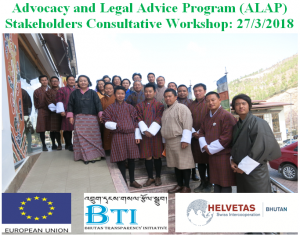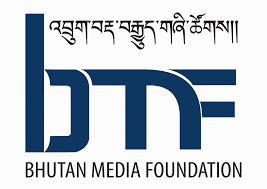Bhutan Transparency Initiative
Posted On: September 26th, 2018
Bhutan Transparency Initiative’s (BTI) project “Advocacy and legal assistance program” (ALAP)’s objective is to translate the concerns of the citizens (those who have no access to justice, victims and witnesses of corruption) into structural changes for better local and national governance. The project will be implemented in a period of 24 months.
It aims to:
- Inform citizens about legal rights and encourage them to take actions against cases of corruption
- Provide legal advice and assistance to victims and witnesses of corruption
- Educate the public on their rights and responsibilities to counter corruption and reporting processes
- Provide effective channels of dialogue to provide feedback on cases
- Make strong networking platforms and partnerships with relevant institutions

The two-year project has already made tremendous progress during its first quarter of implementation.
- It has fielded 2 facilitators with legal background, one in the BTI Thimphu office and one in the ALAP center in Gelephu, Sarpang Dzongkhag.
- It has identified and sensitized stakeholders and partners; resulting in finalized roles and responsibilities of the partners. – 34 participants (26M, 8F) attended the sensitization workshop in Thimphu
– 30 participants (18M, 12F) attended the sensitization workshop in Gelephu
- Committee of Concerned Citizens (CCC), Committee of Legal Experts (CLE) and Youth Engagement Support (YES) were instituted in Thimphu and Gelephu
– Thimphu registered 69 members
– Gelephu registered 87 members
- Advocacy materials on ALAP was designed and disseminated through various media outlets (TV, Radio, visual aids in city buses)
The major challenges BTI faces in delivering the outputs is the ability to bring on board desired individuals from different way of life. Being a program designed to address corruption through citizen participation, many were not forthcoming.
The national election period also deterred several public consultations and meetings.








